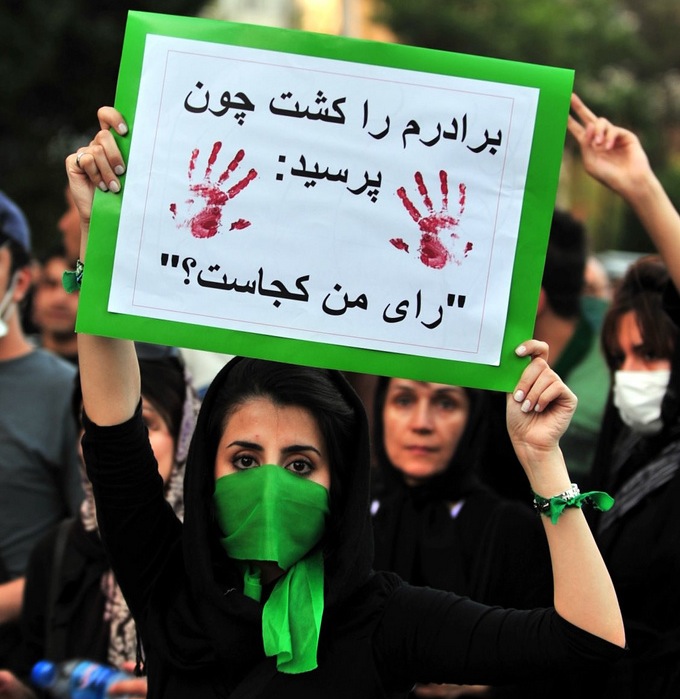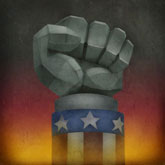Obama’s Sideline Strategy May Signal Shift in U.S. Democracy Policy
It turned out money couldn’t buy a revolution.
Jul 31, 20202.9K Shares229.7K Views
An Iranian protester on Wednesday holds a sign reading, "They killed my brother because he asked: 'Where's my vote?'" (Flickr: Hamed Saber)
It turned out money couldn’t buy a revolution.
After the 2005 election of hardline Iranian President Mahmoud Ahmadinejad, the Bush administration sought about $75 million from Congress with which it hoped to recruit or support alternative voices in Iran to push the Islamic Republic in a more democratic direction. While dissidents in Iran were significantly weaker than during the 1999 student protests — a squelched moment of apparent liberalism that The Economist wrote could be a “second revolution” — there were still prominent voices for reform, like Nobel laureate Shirin Ebadi and journalist Akbar Ganji. Secretary of State Condoleezza Rice, who ultimately got around $66 million from Congress, said the money would go to “
Illustration by: Matt Mahurin
But then something unexpected happened. Ganji visited Washington and told his interlocutors in and out of the administration that accepting the money would be politically toxic, and would give the regime a pretext to persecute its opponents. “Iranians are viewed as discredited when they receive money from foreign governments,” Ganji wrotein an October 2007 Washington Post column. “The Bush administration may be striving to help Iranian democrats, but any Iranian who seeks American dollars will not be recognized as a democrat by his or her fellow citizens.” So strong were Ganji’s sentiments that he urged Congress instead to pass a bill actually banning U.S. financial support to Iranian dissidents. Most of the money ended up unspent.
According to democracy-promotion experts, the rejection of U.S. backing by Iranian dissidents has clear implications for the current struggle, nearly a week old, between the Iranian regime and the growing Iranian opposition movement: stay on the sidelines. Whether that has broader implications for what democracy-promotion strategy under President Obama will become remains to be seen, they said, owing to the complications of the typically acrimonious United States-Iran relationship, but a reduced focus on active sponsorship of would-be reformers could be on the horizon.
“We can’t ignore democracy issues, and can’t ignore their impact, but they also put the U.S. in a very delicate position,” said Thomas Carothers, a democracy specialist with the Carnegie Endowment for International Peace. “This is an Iran-versus-Iran political conflict. The U.S. may have its sympathies but it’s not behind a particular political force. We might support them in their struggle to make sure their voices are heard and respected, but we’re not funding them, we’re not their paymasters or their political directors and so forth.”
Obama said on Monday he was “deeply troubled” by the Iranian regime’s willingness to resort to violence, and while it’s “up to Iranians to make decisions about who Iran’s leaders will be,” there were nevertheless “universal values” like “free speech, the ability of people to peacefully dissent” that the regime needed to respect. His administration has eschewed any more direct statements about the opposition movement, with officials saying off the record that they are careful of saying anything that might be perceived as interfering, which could be counterproductive to the protesters’ goals. The most direct, aggressive known action taken by the administration in the Iranian case has been a communicationon Monday by Jared Cohen, a young State Department official, to the online social-network company Twitter urging its directors to postpone a scheduled site maintenance that would disrupt Iranians’ ability to use what has become a crucial organizing and communications tool.
Trita Parsi, the president of the National Iranian American Council, has praisedObama’s rhetoric as “completely on point.” But many leading Republicans have hammered Obama for not pledging support for the opposition. Sen. John McCain (R-Ariz.), Obama’s 2008 presidential rival, told CNN on Wednesday, “I do not believe that the president is taking a leadership that is incumbent upon an American president, which we have throughout modern history, and that is to advocate for human rights and freedom — and free elections are one of those fundamentals.”
Larry Diamond, a Stanford University political scientist and longtime democracy-promotion expert who directs the Iran Democracy Project at the Hoover Institution, agreed that Obama’s rhetorical support was insufficient. “The initial statements were far too tentative and timid,” Diamond said. “They were really disappointing. They almost seemed on the verge of legitimizing what was pretty obvious from the beginning: a brazen theft of an election.”
Still, Diamond recognized that the effort from the Bush administration at funding Iranian dissidents “backfired,” and left U.S. democracy efforts in Iran with few tools. “We couldn’t spend most of the $70 million at all effectively, and in our efforts to support Iranian democrats directly, we actually did them harm by stigmatizing them and enabling the regime to label them American proxies,” he said. “There’s a growing recognition that these direct efforts to provide assistance are very difficult to execute, and they run a serious risk of backfiring.”
All that suggests that future U.S. efforts at promoting democracy will place the United States in a more firmly supportive role. Jack DuVall of the International Center for Nonviolent Conflict, a nongovernmental organization that provides tools and training for political reformers and democracy activists worldwide, said it was unwise to recruit reformers instead of awaiting their calls for aid. “In our work, we don’t go looking, we only respond to requests,” DuVall said. “We only transfer conceptual knowledge — strategic, tactical — because outsiders won’t make good decisions… because we don’t know the local conditions.” A valuable tool for democracy promoters would be “a guideline that would respond to a description of what indigeneous groups would wish for assistance,” he said. “That makes eminent good sense.”
DuVall took a more positive view of Obama’s rhetoric on Iran than Diamond. “He shifted the frame,” DuVall said, “from [the question of] ‘were the elections fraudulent’ to ‘what’s the responsibility of the Iranian government for peaceful dissent?’ That lays down a marker going forward: this is how we’re assessing you. He doesn’t have to send that in a giant shell shot out of a Howitzer, but it’s a matter of record.”
One thing both experts agreed on was the importance of a White House aide named Michael McFaul. McFaul is currently serving as the National Security Council’s country director for Russia. But his previous position as director of Stanford’s Center on Democracy, Development and the Rule of Law made him one of the leading scholars of the so-called “color revolutions” of the mid-2000s — in which popular outrage over electoral theft prompted liberalization in former Soviet countries — makes him a source of information for any democracy-promotion strategy. “He has a fabulous mind about these issues in question, and is legendary in the field for last 10 years,” DuVall said. Diamond, who worked with McFaul at Stanford, added that while he had no direct knowledge of McFaul’s current activities, “he and others in the administration are knowledgable enough about Iran to know there are very severe limits what we can do directly,” and would probably focus on certain “facilitating factors” like Cohen’s Twitter intervention than “the more direct provision of assistance, money and strategies and so on that might have happened in other democratic transitions.”
McFaul did not respond to a request for comment.
Carothers of the Carnegie Endowment doubted that unfolding events in Iran would prompt the administration to place democracy promotion at the center of its foreign policy. “I think they’ll continue to be cautious and pursue solutions to different security problems,” he said. “It’s not going to cause a fundamental change of U.S. democracy-promotion policy. But though it comes up at a time when the administration had not made [democracy promotion] a major emphasis of its diplomacy, that follows a pattern of U.S. presidents coming to power not planning on making a big emphasis on democracy and then there’s an event and a needs to respond.”
But a strategy for democracy promotion that relies on limited U.S. involvement does not mean indifference to democracy, Diamond said, even in countries with a tradition of anti-American sentiment. “There is a certain class of countries, closed in a similar way to Iran — Cuba is another — where politically, as in China, we can’t really do traditional-type democracy promotion,” he said. Such hard cases make prudent indirect strategies like “providing information and keeping open the flow of democratic ideas and techniques can make a very big difference,” he said. “The more that we can do to put out information about what’s happening right now at the moment, [like] techniques for democratic mobilization and struggle, information about lessons other from mass mobilizations for democracy. The more we can just put that out, on the internet, in indiginous languages, that’s at least a modestly facilitating thing. I think we could’ve done much more of that over the last few years.”

Hajra Shannon
Reviewer
Latest Articles
Popular Articles

